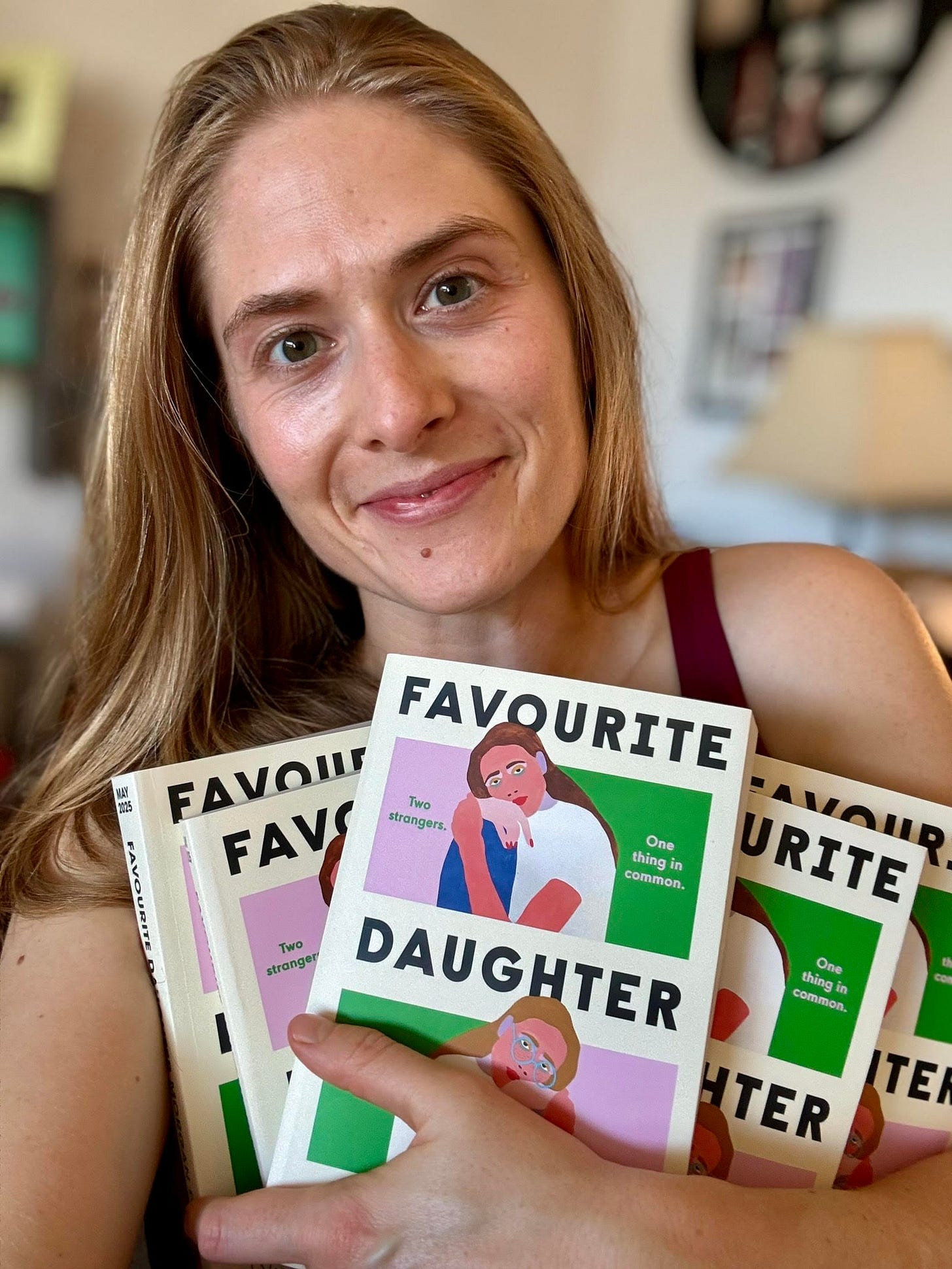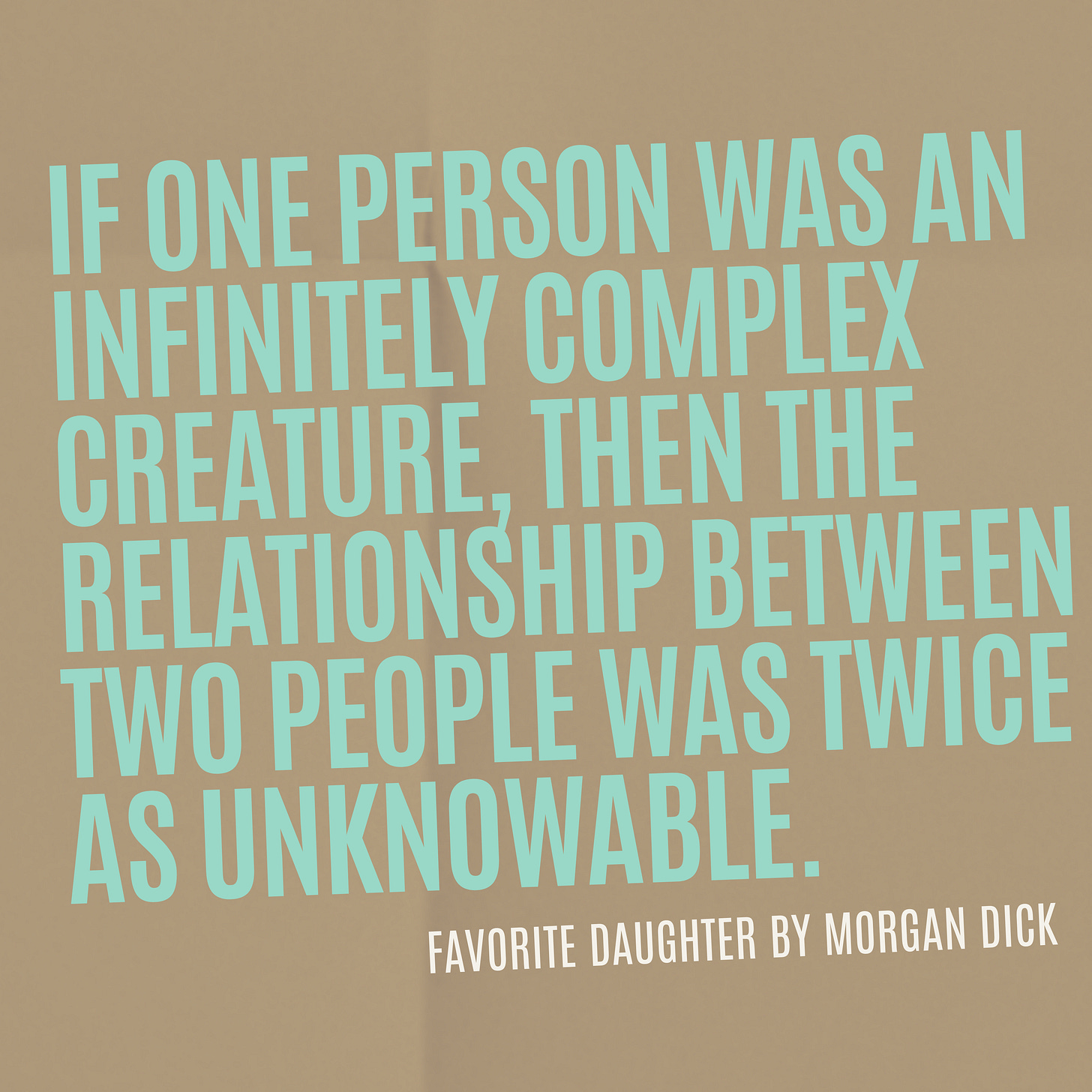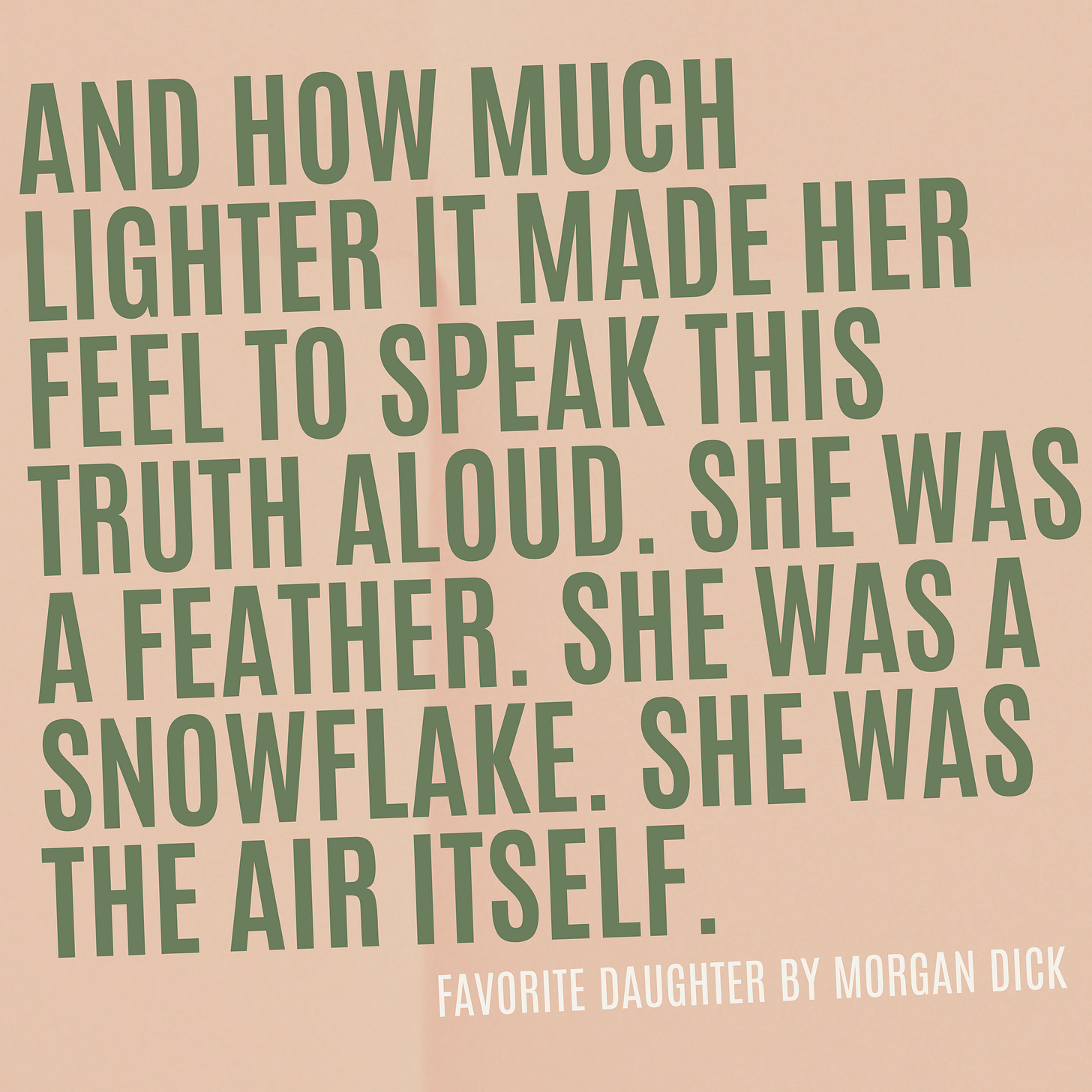Interview with Morgan Dick on her debut novel about addiction, mental health, and sisterhood
Catherine Newman calls FAVORITE DAUGHTER stunningly fresh and darkly funny
A reminder: Words on Words is now The Underlined! New branding, same vibes 💥
And a note: This post is long and may be cut off in your email. To read the entire Q&A, please click to view it in your browser or view it in the Substack app.
My favorite part of this job I created for myself (writing a weekly newsletter) is the opportunity to chat with authors. Really chat with them, like an hour-long conversation over Zoom where we get to bond over serendipitously shared facts or our love for certain under-the-radar books.
The latest conversation I had was with author
, whose debut novel Favorite Daughter comes out on Tuesday.I loved this book so much.
In our conversation, Morgan revealed that pretty language doesn’t come naturally to her. I was like — did I read the right book? What comes naturally to her is story, and the beautifying of text comes afterwards. This tracks. Favorite Daughter is that rare combination of propulsive plot and seductive prose. I underlined the absolute crap out of this book. Connecting with Morgan reminded me, as these interviews always do, that this particular language architect with a book coming out is a normal human being who happens to have an incredible way with words.
Favorite Daughter is the dual-POV story of Mickey and Arlo, half-sisters who have no idea each other exist (thanks, dad!). To Arlo, their shared father was an adoring, admirable man. To Mickey, he was the guy who abandoned her and her mother. When their father dies, Mickey finds out she’s up to receive a sizable inheritance, under one condition: that she attend seven pre-paid therapy sessions with a specific therapist. The therapist? Her half-sister, Arlo. But neither of the sisters know who each other is when the sessions start.
The book hits on heavy topics like addiction and mental health, but it’s also funny and light, page-turning and definitely underlineable. Below, my Q&A with the brilliant author.
Favorite Daughter comes out next Tuesday, April 29. Pre-order your copy! You want this book.
Q&A with
KOLINA CICERO: This is a story about sisters. Do you have siblings?
MORGAN DICK: I have two older siblings, a brother and a sister. We have lots of drama in our family so it makes for good fodder for book ideas, but not in a negative way. My mom's side is Italian so it’s classic loud voices, big personalities, lots of hand gestures. I'm the quiet one at the dinner table, always watching and listening and absorbing. Lots of my family finds its way into my work indirectly.
Output is an accumulation of all of our relationships. So if a character’s not based on a specific person, it's the accumulation of everybody you’ve known or every experience you've had.
Yes! Whenever someone asks me about the premise of this book, I almost have a hard time describing it because I feel like it came from so many different corners of my life.
Arlo is a therapist. Do you have a background in psychology?
I'm an occupational therapist and have worked in the mental health sphere in lots of different roles. I've always admired what psychologists do because I think they have to be so careful about not bringing their personal baggage into their client work. That struck me as an interesting place for a story to unfold because in a therapy session, you have the client who's seeking help and you have the therapist who's in this position of power and they're supposed to provide support and guidance. I was curious about this idea of giving a therapist some baggage of her own and how it would get entangled and how the power dynamics would shift back and forth.
There's one scene in the book where Mickey’s looking at the clock and being like, oh my God, I have to be in this room for 40 more minutes. That totally came from me. I've been in that situation like, I'm trapped here and they're making me think about things I don't want to think about and talk about things I don't want to talk about. A lot of Mickey’s client perspective came from my lived experience of working with therapists as a client.
It seems like you have an interest in the brain and how it works. There are a lot of brain references in the book. Here’s a line: “Yes, Arlo thought as the pyrotechnics in her brain stem started up again.” I loved that technical way of thinking.
I did do an undergrad in psychology. I had envisioned becoming a psychologist, but then I got more exposure to the field and learned about other roles and thought I’d be better suited to something else. But the brain has always fascinated me and I like writing characters who have a little bit of that knowledge themselves, because then you can play with that in their point of view. Like, Arlo would know what the brainstem is. It’s also so much easier to write a character whose point of view you can relate to. You can draw from your personal experience. That's partly why so much of this is about mental health and why Arlo’s a psychologist instead of something I had no exposure to.
You tackle mental health, addiction, and grief in a big way. How did you find the courage to write about these heavy topics and make sure you were doing it right?
It was really scary, honestly.
Those are themes that impact so many people, and you want to do it justice and write something that feels authentic. What helped in terms of writing about addiction is that my brother is a recovering alcoholic, so the book drew a lot on my lived experience as a family member of an addict and how that can play out in families. They often call it a family disease, and I think for good reason. It really does impact siblings, parents, friends, everybody. I had a couple of conversations with him and he was very generous about his experience, and that helped inform the character of Mickey. Obviously they're very different people, but that was helpful. I also did lots of research about adult children of alcoholics, because that's not something I have direct experience with.
Then Arlo deals with a lot of codependency with her dad. She hero worships him and has had this relationship where they are too enmeshed. So once the dad dies, she doubly experiences grief, because it wasn't just her dad she was losing but also this person who she was so deeply enmeshed with.
I don't have any experience with addiction myself, but a lot of the book also draws on my experiences of mental illness and coping with that and this question I've always had of whether or not people can get better and whether people who are struggling can make the changes they need to make in their lives to move forward. What helped when writing this was coming back to that question and trying to find hope and leave people in a place where they felt like second chances are possible. Whether you're dealing with ADHD, depression, alcoholism, whether you're experiencing a loss — there will be life still after that, and you're deserving of a second chance.
Whether you're dealing with ADHD, depression, alcoholism, whether you're experiencing a loss — there will be life still after that, and you're deserving of a second chance.
That’s so hopeful. What a smart idea to have a question that you want to answer when you're writing.
I always write from a place of confusion. Bianca Marais says on her podcast —
— that she writes from a place of rage, and I definitely write from a place of confusion. There's some sort of question that I'm just not quite sure of the answer to and I need to write a story to figure that out.The prose is beautiful. I underlined so many so many things — I tore that book up.
Oh, thank you. That's satisfying because I revised it 18 million times. I like pretty prose in books too, so I do try and slide it in there when I can, but I don't think it's something that comes super naturally to me. I have to really work at it over many, many drafts. I think I have a more natural sense for story and the dynamics in a scene, and making it sound good comes with a lot of revision and a lot of different tries.
There’s a sentence toward the very end of the novel and I feel like it’s the theme of the whole book: “If one person was an in infinitely complex creature, then the relationship between two people was twice as unknowable.”
What a fucking good sentence. Does it feel right to you that that's what the novel is about?
I think so, yes. I love that you picked up on that. It's very much counter to where Mickey starts in the book, Mickey being that person who thinks people are simple and self-serving and that's really all there is to it. But we arrive at this point where we see that people are messy and people are many things and people are always changing, and our relationships are messy and varied and always changing. It's a disservice to ourselves to try and label things simply.
Did you draw on anything from your personal life for the premise of the book?
The first nugget of inspiration came from watching my dad — who is an adoptee — connect with his biological half-siblings for the first time as an adult. Something changed with the way they did the adoption records where I live, and the records were unsealed and he could see who his parents were, which led to him reconnecting with all of these biological family members. I saw him interact with his half-siblings who look like each other and sound like each other. They even have some of the same interests! My dad has always been a big animal person, like an animal whisperer. He's the one the dogs come to in the dog park. And then we learn that his family has this huge farming background and animals have always been important to them. It really planted this question in my mind about how much of our personality is nature versus nurture. And if we had two half-siblings who didn't know they were half-siblings and who were raised separately, how much would they share in terms of their traits, their vices, their hopes and dreams? And then I was thinking about what would be a really juicy ethical dilemma to put them in. What's a setting where we could put these two siblings who don't know they’re siblings and have them at odds over something in the most dramatic way? That led to me thinking about the therapy room as a setting for these two people to meet and how awkward that would be and all of the marvelous tension that could come from that.
I love your Rebel, Rebel series on Substack about authors breaking writing rules. Do you find yourself breaking any so-called writing rules?
I love breaking rules! I love using adverbs. Often I use them ironically because I think they can be funny. I like using adjectives. I use the word “very” quite often. I use the word “just” quite often. These little things don't stress me out so much. I think if you are using them right, which is to create a voice, then they're not going to distract the reader or bump them out of the story. So on a line level, I feel like I'm breaking rules all the time.
This is written in a very close third-person POV. Tell me about that choice.
I don't love the first person in general, and I tend to write more third-person close. But especially for a dual point of view book, I was like, there's no way I can write two first-person narrators and be able to distinguish them enough. So very practically, that's why I wanted it to be third-person. But I love third person close because I think it's so fun. You can almost play with the subconscious.
There dialogue reads so authentically to me. Oftentimes the characters are talking about two different things, which feels like real life.
I took a workshop a while back and something that came out of it that stuck with me was that people seldom say what they actually mean. They seldom answer a question with yes or no.
Let’s talk about books! Safe to assume you’re a big reader? What do you like to read?
Of course I'm a big reader! We are all readers first. You cannot be a good writer without reading. Reading is the magic. You can only write a handful of books in your life, but you can read hundreds and thousands of them. I try to go outside of my comfort zone every now and then. I’m naturally drawn to literary and upmarket fiction in that book club space, but I do like to venture into different genres sometimes. I've been reading a bit more romance this year, and I'm about to start a thriller for my book club, which is something I wouldn’t normally gravitate toward.
As for authors, I love Kevin Wilson. Meg Mason's Sorrow & Bliss had a really big impact on this book in particular. I love Mona Awad, who writes literary horror. One of my favorite books of last year was The Husbands by Holly Gramazio. I read a great graphic memoir recently by Teresa Wong, All Our Ordinary Stories. I try and dip my toe into some of these other pools because, why not? There's something we can enjoy and appreciate and learn in every genre.
Reading is the magic. You can only write a handful of books in your life, but you can read hundreds and thousands of them.
Do you read as a reader or a writer?
It’s hard to distinguish between the two. I'm probably always reading as a writer because I don't know how to turn that switch off, but that doesn't mean that I'm not reading for entertainment, too. Ultimately, I think books should be pleasurable and they should be entertaining, so I let myself enjoy them.
Do you have a go-to book that you recommend when people ask for recommendations?
The Husbands was a book that I was recommending to everyone when it came out. The Wedding People by Alison Espach is another go-to recommendations. Also her other novel, Notes on Your Sudden Disappearance is great. There's a lot of great queer lit that has come out in the last year or two. Emily Austin is one of my favorite queer authors I read. I like playing Book Matchmaker for people though.
Last question! Do you annotate or underline while reading?
I just dog ear the bottom page. It's a very inefficient system. I mostly read in bed before I fall asleep, so if I see something interesting, I'll dog ear it. But then I’ll go back to it a month later and be like, what was it about this thing that I liked? And sometimes I can't find it, so it’s a wildly inefficient method.
Preorder Favorite Daughter here.
What are you reading? What are you underlining?
What I’m reading: Demon Copperhead by Barbara Kingsolver and You Could Make This Place Beautiful by
(and wow, what a book).What I’m underlining: [From Demon Copperhead]: “She asked me what I wanted to be whenever I grew up. I had to think about that. We went past some barns and tobacco fields with their yellow-green leaves waving in the sad evening light. She looked over at me and said, Hey, why so glum, chum? I told her nobody ever asked me that question before, about growing up and what I wanted to be, so I didn’t know. Mainly, still alive.”











What a great interview, especially this: "You cannot be a good writer without reading. Reading is the magic. You can only write a handful of books in your life, but you can read hundreds and thousands of them."
Right now I've just started reading Toni Morrison's Sula and underlined this last night from the foreword: "But the act of writing was too personally important for me to abandon it just because the prospects of my being taken seriously were bleak."
Another gem you have recommended Kolina Cicero. I will pre- order. Thank you.